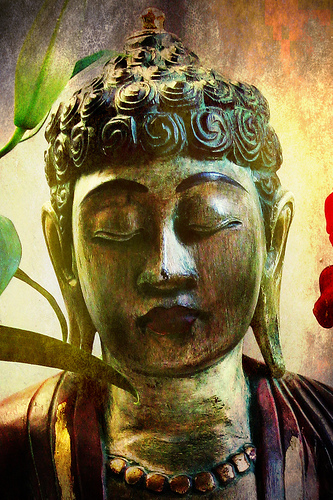“Everything that irritates us about others can lead us to a better understanding of ourselves.” ~Carl Jung
The other day someone I love, who we’ll call Tania, got in a massive fight with her boyfriend. She called me to explain the situation, and ultimately got frustrated because I wouldn’t agree that he was not only wrong, but also a jerk.
The next day, she and I had a disagreement that ended with her yelling at me. When I discussed this with someone else who loves us both but frequently clashes with Tania (not my finest decision), she quickly turned on Tania, calling her a jerk.
One hour later, I received an email from someone who wanted to let me know she got my book as a gift, but would never have bought it for herself because it wasn’t about Buddhism and was, therefore, pathetic.
It was an emotionally draining day, but in this moment I stepped outside it to think about the reductionist instinct.
It’s when we fail to consider complex factors, and instead reduce a situation to one simple explanation—in these cases, one harsh judgment.
Maybe you’ve been there before. Someone hurts you deeply, and you decide they did it because they’re a bad person. Or someone says something that threatens a belief you hold dear, so you decide they’re ignorant.
It’s easier to label a person or a thing than it is to look below the surface, and look within to understand why we’re reacting so strongly. That’s not the most comfortable thing to do.
I know I’ve been there before. For me, it often happens when I feel someone isn’t prioritizing me. This can make me start doubting myself—but it’s far easier to label that person as selfish or inconsiderate than it is to acknowledge that I’m feeding into old insecurities.
Other people aren’t perfect. None of us are. People will make mistakes sometimes. At other times, they’ll do things we simply don’t agree with, and it will be tempting to make them wrong so that we can feel good about being right or better about being hurt.
But all this does is create a world of people accusing each other to avoid looking within. Ultimately, those are our choices: assume the worst in other people, or understand why we feel the instinct to do it, and in doing so, bring out the best in ourselves.

Photo by AlicePopkorn
About Lori Deschene
Lori Deschene is the founder of Tiny Buddha. She started the site after struggling with depression, bulimia, c-PTSD, and toxic shame so she could recycle her former pain into something useful and inspire others to do the same. You can find her books, including Tiny Buddha’s Gratitude Journal and Tiny Buddha’s Worry Journal, here and learn more about her eCourse, Recreate Your Life Story, if you’re ready to transform your life and become the person you want to be.
- Web |
- More Posts












 Though I run this site, it is not mine. It's ours. It's not about me. It's about us. Your stories and your wisdom are just as meaningful as mine.
Though I run this site, it is not mine. It's ours. It's not about me. It's about us. Your stories and your wisdom are just as meaningful as mine.
Hello Lori,
I signed up for the daily emails about two months ago and I have gained a tremendous amount of knowledge from each of your postings.
Thank you for writing such a thoughtful piece, especially given that this time of year misunderstandings and hurt feelings take place and oftentimes carry over into the new year.
I hope to keep your thoughts in mind as I work on developing an authentic and consistent element of humility in my life to keep me grounded in the fact that I too make mistakes and should be more forgiving and less judgmental of others.
I like the daily emails, they usually remind me to stop for a moment. More often than not there is something that hits a personal note in them.
I’m glad you enjoy them!
You’re most welcome. =) Authenticity and humility are two things I work toward, as well. I stumble sometimes, but I know that I feel good about who I’m being when I treat people as I want to be treated.
You don’t even know how relevant this post is to my life right now. I had a knot in my stomach over someone who is making me so angry with her actions! But then I read this, and it really made me feel so much better. Thank you!
You’re most welcome!
A very good post again Lori!
I agree that none of us is perfect. The thing is that everyone should try to look inside for a better understanding. For example if two people are arguing both should step back and reflect otherwise it will be a bit unfair.
That would certainly make the world a kinder place!
OMG how ironic,I havent read the article yet but just the head line ”Everything that irritates us about others can lead us to a better understanding of ourselves” I’ve literally just had a conversation with someone that has slightly wound me up. Well its my sister, she is having trouble with dark circles under her eyes blah blah blah, anyway she uses a concealer which after some time cakes up and looks worse than the dark eyes, so I thought I shoulde tell her that maybe she should use less…lord and behold she bites my head off as she usually does when someone is correcting her, I keep trying but I think as the year is drwaing to an end I’ll just watch her make her mistakes and look stupid maybe that will help her learn, maybe that will teach her. I do feel sorry for her though she doesn’t take criticism very well but then she needs to know that she does not know it all….right? Just like us all.
I know what these kinds of interactions are like–I’ve had my fair share! There was a time when I was incredibly defensive over everything. Even the slightest criticism felt like a threat. It’s an exhausting way to live. That’s ultimately why I started to change in that regard–I just didn’t have the energy to be so defensive anymore!
I know right…I guess that is why it hurts so much because I was like that aswell. I hope she learns sooner rather than later. This article and the interaction I had made me realise that I am on the right path. Thanks Lori
You’re most welcome. =)
I guess labels are a human convenience thing. Like putting a puzzle in a box, it looks tidy from the outside without having to solve the actual puzzle, like a box though it will eventually spill out!Its a good ‘game’ to play trying not to label everyday things and describe them, down to the daily things like seeing a bird outside the window, have a go at describing it rather than just labeling it a bird.My guess is playing the game will help appreciate the ‘good’ things and may lead to an understanding of the ‘bad’.
Running Barefoot
Yes, like a mental shortcut. I actually read that somewhere not too long ago. Great analogy with playing the game. It might be more complicated to actually try to make the puzzle, but that’s the best way to fully enjoy it.
Thanks for this. I find a lot of comfort in your blog.
You’re welcome. I’m so glad it helps. =)
This is exactly my growing process that I am going through right now. Its hard to break old habits. The part you mention about when people aren’t prioritizing you, sending you into self doubting mode, has been something I have done all my life. Reducing a situation to one harsh judgment is my specialty…but I’m really working on this stuff right now and it really makes a difference. When events occur my initial reaction may be somewhat the same but when I step back and look into my feelings, why I’m judging these people so harshly, it can calm my reactions down really quite quickly
It’s nice to know you can relate! I always say that self-awareness is the foundation of peace, because once we recognize what’s going on internally, we can choose to do something about it.
I love this post/message right words are so hard to find when our immediate emotions can cloud our vision. Thank you!
You’re most welcome!
…So then if this is the case, how do you begin to stop feeding into old insecurities?
Hello,
I used this for a school project about how labels affect people and it was very helpful! I subscribed to the newsletter, and I love to browse this site on my free-time! Thank you for such and amazing site!
-Carrie
You’re most welcome. I’m glad you’ve enjoyed the site! =)
The issue here with labeling is that people easily judge others without knowing the person, situation, story or anything for that matter. You often hear people talking about others and not know the possible dilemma which by labeling or judging will cause a detrimental effect. Don’t judge a book by its cover. That’s it.